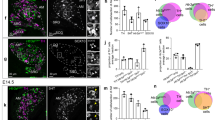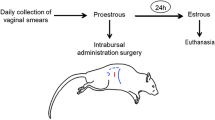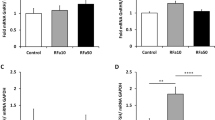Abstract
FUNCTIONAL development of the pituitary–adrenal axis in the foetus seems to be of considerable importance in influencing the maturation of other foetal organ systems, and the timing of parturition1–2. In several species including man3,4, sheep2 and rabbits5, there is evidence for an increase in foetal adrenal function in late pregnancy, which seems to depend on the activities of the foetal pituitary and hypothalamus2. The factors responsible for stimulating foetal adrenal development during late gestation remain poorly understood, however. From detailed studies in foetal sheep, it is apparent that the prepartum acceleration of adrenal growth and glucocorticoid secretion is not preceded by elevated ACTH concentrations in the foetal plasma6,7. But, prostaglandin E2 (PGE2) administered intra-arterially into the foetus stimulated an increase in the concentration of cortisol in foetal plasma8 at a stage of pregnancy when the adrenal gland was essentially unresponsive to endogenous or exogenous ACTH (refs 2, 9). Experiments in newborn lambs suggest that the pituitary or brain rather than the foetal adrenal gland was the likely site of the PGE2 action10, raising the possibility that other pituitary peptides might mediate this effect. The ACTH related peptides, α-melanocyte stimulating hormone (αMSH) and corticotropin-like intermediate lobe peptide (CLIP) have been identified in human foetal pituitaries, and it has been suggested that the ratio of these peptides to ACTH might be critical to maturation of foetal adrenal function11. We have examined the ability of one of these peptides, αMSH, to influence adrenal function in the rabbit foetus. We present here evidence that the foetal adrenal secretes cortisol in response to αMSH at stages in pregnancy when it is unresponsive to ACTH, but as the sensitivity to ACTH increases, the relative response to αMSH is diminished.
This is a preview of subscription content, access via your institution
Access options
Subscribe to this journal
Receive 51 print issues and online access
$199.00 per year
only $3.90 per issue
Buy this article
- Purchase on Springer Link
- Instant access to full article PDF
Prices may be subject to local taxes which are calculated during checkout
Similar content being viewed by others
References
Avery, M. E. Br. med. Bull. 31, 13–18 (1975).
Thorburn, G. D., Challis, J. R. G. & Robinson, J. S. in Biology of the Uterus (ed. Wynn, R. M.) 653–732 (Plenum, New York, 1977).
Murphy, B. E. P., Patrick, J. E. & Denton, R. L. J. clin. endocr. Metab. 40, 164–167 (1975).
Fend, M. de M. & Tulchinsky, D. New Engl. J. Med. 292, 133–136 (1975).
Mulay, S., Giannopoulos, G. & Solomon, S. Endocrinology 93, 1342–1348 (1973).
Rees, L. H., Jack, P. M. B., Thomas, A. L., Nathanielsz, P. W. Nature 253, 274–275 (1975).
Jones, C. T., Boddy, K. & Robinson, J. S. J. Endocr. 72, 93–300 (1977).
Louis, T. M., Challis, J. R. G., Robinson, J. S. & Thornburn, G. D. Nature 264, 797–798 (1976).
Jones, C. T., Boddy, K., Robinson, J. S. & Ratcliffe, J. G. J. Endocr. 72, 279–292 (1977).
Challis, J. R. G., Carson, G. D. & Naftolin, F. J. Endocr. (in the press).
Silman, R. E., Chard, T., Lowry, P. J., Smith, I. & Young, I. M. Nature 260, 716–718 (1976).
Challis, J. R. G., Davies, I. J., Benirschke, K., Hendrickx, A. G. & Ryan, K. J. Endocrinology 96, 185–192 (1975).
Giannopoulos, G., Hassan, Z. & Solomon, S. J. biol. Chem. 249, 2424–2427 (1974).
Ganjam, V. K., Campwell, A. L. & Murphy, B. E. P. Endocrinology 91, 607–613 (1972).
Albano, J. D. M., Jack, P. M., Joseph, T., Gould, R. P., Nathanielsz, P. W. & Brown, B. L. J. Endocr. 71, 333–341 (1976).
Jaffe, R. B., Seron-Ferre, M., Huhtaniemi, I. & Korenbrot, C. J. Steroid Biochem. (in the press).
Jost, A. in Foetal Autonomy (eds. Wolstenholme, G. E. W. & O'Connor, M.). Ciba Fdn Symp. 79–89 (Churchill, London 1969).
Lowry, P. J., McMartin, C. & Peters, J. J. Endocr. 59, 43–55 (1973).
Chard, T., Silman, R. E. & Rees, L. H. in The Foetus and Birth (eds. Knight, J. & O'Connor, M.) Ciba Fdn Symp. 354–370 (Elsevier, Amsterdam, 1977).
Author information
Authors and Affiliations
Rights and permissions
About this article
Cite this article
CHALLIS, J., TOROSIS, J. Is α MSH a trophic hormone to adrenal function in the foetus?. Nature 269, 818–819 (1977). https://doi.org/10.1038/269818a0
Received:
Accepted:
Issue Date:
DOI: https://doi.org/10.1038/269818a0
This article is cited by
-
Stimulation of aldosterone production by β-melanotropin
Nature (1981)
-
Immunoreactive α-MSH in human plasma in pregnancy
Nature (1978)
-
The ACTH ‘family tree’ of the rhesus monkey changes with development
Nature (1978)
Comments
By submitting a comment you agree to abide by our Terms and Community Guidelines. If you find something abusive or that does not comply with our terms or guidelines please flag it as inappropriate.



